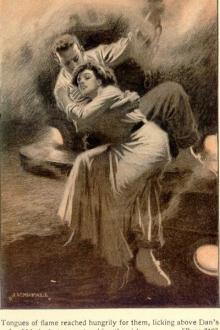The Lighthouse, Robert Michael Ballantyne [summer reading list .txt] 📗

- Author: Robert Michael Ballantyne
Book online «The Lighthouse, Robert Michael Ballantyne [summer reading list .txt] 📗». Author Robert Michael Ballantyne
The boat, which had entered the cavern by its seaward mouth, was a small one, manned by two fishermen, who were silent as they rowed under the arched roof; but it was evident that their silence did not proceed from caution, for they made no effort to prevent or check the noise of the oars.
In a few seconds the keel grated on the pebbles, and one of the men leaped out.
"Noo, Davy," he said, in a voice that sounded deep and hollow under that vaulted roof, "oot wi' the kegs. Haste ye, man."
"'Tis Big Swankie," whispered Ruby.
"There's nae hurry," objected the other fisherman, who, we need scarcely inform the reader, was our friend, Davy Spink.
"Nae hurry!" repeated his comrade angrily. "That's aye yer cry. Half o' oor ventures hae failed because ye object to hurry."
"Hoot, man! that's enough o't," said Spink, in the nettled tone of a man who has been a good deal worried. Indeed, the tones of both showed that these few sentences were but the continuation of a quarrel which had begun elsewhere.
"It's plain to me that we must pairt, freen'," said Swankie in a dogged manner, as he lifted a keg out of the boat and placed it on the ground.
"Ay," exclaimed Spink, with something of a sneer, "an' d'ye think I'll pairt without a diveesion o' the siller tea-pots and things that ye daurna sell for fear o' bein' fund out?"
"I wonder ye dinna claim half o' the jewels and things as weel," retorted Swankie; "ye hae mair right to _them_, seein' ye had a hand in findin' them."
"_Me_ a hand in findin' them," exclaimed Spink, with sudden indignation. "Was it _me_ that fand the deed body o' the auld man on the Bell Rock? Na, na, freend. I hae naething to do wi' deed men's jewels."
"Have ye no?" retorted the other. "It's strange, then, that ye should entertain such sma' objections to deed men's siller."
"Weel-a-weel, Swankie, the less we say on thae matters the better. Here, tak' haud o' the tither keg."
The conversation ceased at this stage abruptly. Evidently each had touched on the other's weak point, so both tacitly agreed to drop the subject.
Presently Big Swankie took out a flint and steel, and proceeded to strike a light. It was some some time before the tinder would catch. At each stroke of the steel a shower of brilliant sparks lit up his countenance for an instant, and this momentary glance showed that its expression was not prepossessing by any means.
Ruby drew Minnie farther into the recess which concealed them, and awaited the result with some anxiety, for he felt that the amount of knowledge with which he had become possessed thus unintentionally, small though it was, was sufficient to justify the smugglers in regarding him as a dangerous enemy.
He had scarcely drawn himself quite within the shadow of the recess, when Swankie succeeded in kindling a torch, which filled the cavern with a lurid light, and revealed its various forms, rendering it, if possible, more mysterious and unearthly than ever.
"Here, Spink," cried Swankie, who was gradually getting into better humour, "haud the light, and gie me the spade."
"Ye better put them behind the rock, far in," suggested Spink.
The other seemed to entertain this idea for a moment, for he raised the torch above his head, and, advancing into the cave, carefully examined the rocks at the inner end.
Step by step he drew near to the place where Ruby and Minnie were concealed, muttering to himself, as he looked at each spot that might possibly suit his purpose, "Na, na, the waves wad wash the kegs oot o' that if it cam' on to blaw."
He made another step forward, and the light fell almost on the head of Ruby, who felt Minnie's arm tremble. He clenched his hands with that feeling of resolve that comes over a man when he has made up his mind to fight.
Just then an exclamation of surprise escaped from his comrade.
"Losh! man, what have we here?" he cried, picking up a small object that glittered in the light.
Minnie's heart sank, for she could see that the thing was a small brooch which she was in the habit of wearing in her neckerchief, and which must have been detached when Ruby carried her into the cave.
She felt assured that this would lead to their discovery; but it had quite the opposite effect, for it caused Swankie to turn round and examine the trinket with much curiosity.
A long discussion as to how it could have come there immediately ensued between the smugglers, in the midst of which a wavelet washed against Swankie's feet, reminding him that the tide was rising, and that he had no time to lose.
"There's nae place behint the rocks," said he quickly, putting the brooch in his pocket, "so we'll just hide the kegs amang the stanes. Lucky for us that we got the rest o' the cargo run ashore at Auchmithie. This'll lie snugly here, and we'll pull past the leftenant, who thinks we havena seen him, with oor heeds up and oor tongues in oor cheeks."
They both chuckled heartily at the idea of disappointing the preventive officer, and while one held the torch the other dug a hole in the beach deep enough to contain the two kegs.
"In ye go, my beauties," said Swankie, covering them up. "Mony's the time I've buried ye."
"Ay, an' mony's the time ye've helped at their resurrection," added Spink, with a laugh.
"Noo, we'll away an' have a look at the kegs in the Forbidden Cave," said Swankie, "see that they're a' richt, an' then have our game wi' the land-sharks."
Next moment the torch was dashed against the stones and extinguished, and the two men, leaping into their boat, rowed away. As they passed through the outer cavern, Ruby heard them arrange to go back to Auchmithie. Their voices were too indistinct to enable him to ascertain their object in doing so, but he knew enough of the smugglers to enable him to guess that it was for the purpose of warning some of their friends of the presence of the preventive boat, which their words proved that they had seen.
"Now, Minnie," said he, starting up as soon as the boat had disappeared, "this is what I call good luck, for not only shall we be able to return with something to the boat, but we shall be able to intercept big Swankie and his comrade, and offer them a glass of their own gin!"
"Yes, and I shall be able to boast of having had quite a little adventure," said Minnie, who, now that her anxiety was ever, began to feel elated.
They did not waste time in conversation, however, for the digging up of two kegs from a gravelly beach with fingers instead of a spade was not a quick or easy thing to do; so Ruby found as he went down on his knees in that dark place and began the work.
"Can I help you?" asked his fair companion after a time.
"Help me! What? Chafe and tear your little hands with work that all but skins mine? Nay, truly. But here comes one, and the other will soon follow. Yo, heave, _Ho_!"
With the well-known nautical shout Ruby put forth an herculean effort, and tore the kegs out of the earth. After a short pause he carried Minnie out of the cavern, and led her to the field above by the same path by which they had descended.
Then he returned for the kegs of gin. They were very heavy, but not too heavy for the strength of the young giant, who was soon hastening with rapid strides towards the bay, where they had left their friends. He bore a keg under each arm, and Minnie tripped lightly by his side,--and laughingly, too, for she enjoyed the thought of the discomfiture that was in store for the smugglers.
CHAPTER TWENTY.
THE SMUGGLERS ARE "TREATED" TO GIN AND ASTONISHMENT.
They found the lieutenant and Captain Ogilvy stretched on the grass, smoking their pipes together. The daylight had almost deepened into night, and a few stars were beginning to twinkle in the sky.
"Hey! what have we here--smugglers?" cried the captain, springing up rather quickly, as Ruby came unexpectedly on them.
"Just so, uncle," said Minnie, with a laugh. "We have here some gin, smuggled all the way from Holland, and have come to ask your opinion of it."
"Why, Ruby, how came you by this?" enquired Lindsay in amazement, as he examined the kegs with critical care.
"Suppose I should say that I have been taken into confidence by the smugglers and then betrayed them."
"I should reply that the one idea was improbable, and the other impossible," returned the lieutenant.
"Well, I have at all events found out their secrets, and now I reveal them."
In a few words Ruby acquainted his friends with all that has just been narrated.
The moment he had finished, the lieutenant ordered his men to launch the boat. The kegs were put into the stern-sheets, the party embarked, and, pushing off, they rowed gently out of the bay, and crept slowly along the shore, under the deep shadow of the cliffs.
"How dark it is getting!" said Minnie, after they had rowed for some time in silence.
"The moon will soon be up," said the lieutenant. "Meanwhile I'll cast a little light on the subject by having a pipe. Will you join me, captain?"
This was a temptation which the captain never resisted; indeed, he did not regard it as a temptation at all, and would have smiled at the idea of resistance.
"Minnie, lass," said he, as he complacently filled the blackened bowl, and calmly stuffed down the glowing tobacco with the end of that marvellously callous little fingers, "it's a wonderful thing that baccy. I don't know what man would do without it."
"Quite as well as woman does, I should think," replied Minnie.
"I'm not so sure of that, lass. It's more nat'ral for man to smoke than for woman. Ye see, woman, lovely woman, should be `all my fancy painted her, both lovely and divine.' It would never do to have baccy perfumes hangin' about her rosy lips."
"But, uncle, why should man have the disagreeable perfumes you speak of hanging about _his_ lips?"
"I don't know, lass. It's all a matter o' feeling. `'Twere vain to tell thee all I feel, how much my heart would wish to say;' but of this I'm certain sure, that I'd never git along without my pipe. It's like compass, helm, and ballast all in one. Is that the moon, leftenant?"
The captain pointed to a faint gleam of light on the horizon, which he knew well enough to be the moon; but he wished to change the subject.
"Ay is it, and there comes a boat. Steady, men! lay on your oars a bit."
This was said earnestly. In one instant all were silent,





Comments (0)